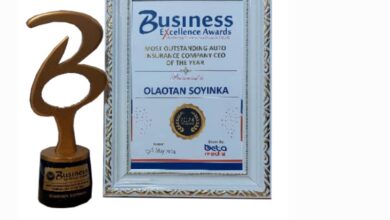Insurance Industry: Mental Health In A Post-Pandemic Landscape

By Claire Russell, Founder/CEO, Mental Health In Business
Claire Russell was open with Huw Edwards about her own experience of mental ill-health which drove her interest and passion in mental health in the workplace. She has worked in insurance all of her life, setting up her first brokerage at the age of 21. Her own personal experiences led to her retraining and she is now providing leading mental health training and support to the insurance industry.
Personal experience
Claire identified the industry as having a work hard, play hard culture with people pushing themselves to the limit – alongside barriers that prevent people from speaking up when they are struggling for a fear of being seen as weak.
Claire highlighted how she became very adept, like a lot of people do, at putting on her work clothes like a shield, becoming very good a wearing a mask and turning up to work and doing what needed to be done. Claire believes that her own mental ill health was due to a mix of reasons including the lack of a good work-life balance and that insurance work by nature, holds a lot of client responsibility.
Claire acknowledges that she didn’t ask for help at the time she needed it, and that she wasn’t aware of any help that was available to her at that point. It was the support of her friends and family that helped her to seek the professional help and treatment that she needed.
Moving forward
Claire believes that the industry has made advances in the last few years, but it is still difficult for individuals to put their hand up and admit they are struggling and need help. She believes that there is much still to do to create a culture within every organisation to provide access to help and ensure that there are trained people who make it easy for colleagues to access resources.
Claire highlighted that she comes across organisations all the time now where there have been huge steps forward in establishing a positive workplace culture where people support has been established. She cited the work that BIBA is doing in leading the way in the industry – including the 2019 conference panel with Freddie Flintoff which was one of the most well-received sessions. She also outlined the championing of mental health that BIBA has been doing including providing workshops for members which were well-received – showing there is an appetite for change.
Core standards
Claire feels that for many organisations the desire is there to do better, do the right thing and do more to look after employees but there is still a lack of understanding as to what to do – what the right steps to take are. She outlined the core standards from the 2017 independent review of workplace mental health, which are intended to be guidelines for every business.
Claire also highlighted a study of the insurance industry that she is currently working on with BIBA to benchmark businesses in the industry against these standards so that it can be understood where businesses are doing the right thing and where more resource and guidance can be provided to help further. She outlined the standards as making sure every business has a written mental health strategy, ensuring that they are training people in every workplace to help and support, and provide signposting to professional help where needed, along with ensuring people who have line management responsibility are able to support staff mental wellbeing. You can take the survey to help us here https://www.surveymonkey.co.uk/r/QZK5BQM
Impact of the pandemic
Claire discussed how the majority of our sector have found themselves working from home since the pandemic which has been an enormous change bringing issues such as managing client relationships and colleague relationships remotely without human connection. Claire outlined recent surveys which have shown a 50% increase in people experiencing anxiety and depression during the pandemic.
Discussing positives that arose from the pandemic, Claire hopes that we can take forward the way that many have seen others in a very different light. For example, where CEOs and office juniors have been on Zoom calls together seeing into each other’s lives – something we have never experienced before.
Claire believes that this has given us an insight into each other’s ‘humanness’ and that we need to remember that we are all more than our role in the business, we are whole people and the issues impacting us might come from inside or outside of the business.
Identifying the businesses that have done well on mental wellbeing, Claire believes that they are the ones that have focused on each individual’s needs, not taken a broad brush approach, but finding out what individual’s personal experiences are. She stressed that we are not all in the same boat as we are all different people with different challenges, domestic situations and we all respond differently to things.
Stigma and language
To achieve real change, Claire believes that we need to look at the language used about mental health and mental ill-health as there is still a lot of misunderstanding. To eradicate stigma (and Claire believes that there is still an unacceptable level of stigma) and establish healthy workplace cultures the starting point is thinking about language, for leaders to consider the language they use and be prepared to challenge, including the expanded workplace of home, online and various different platforms.
Claire outlined how 300,000 people a year lose their job due to mental ill-health and believes that cultures need to change and these need to be driven from the top. She believes that there must be strong genuine leadership buy-in and not just a box-ticking exercise.
Claire concluded that she is optimistic, she is talking to businesses day in, day out and the majority of them are incredibly positive and forward-thinking – with a real desire for organisations to do better going forward.
Source: https://www.biba.org.uk/





